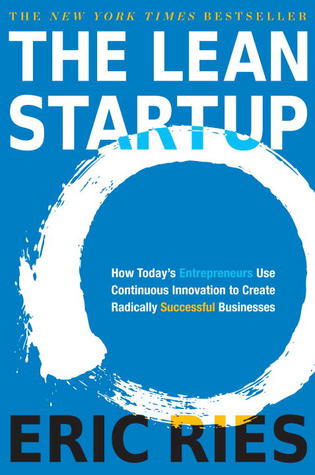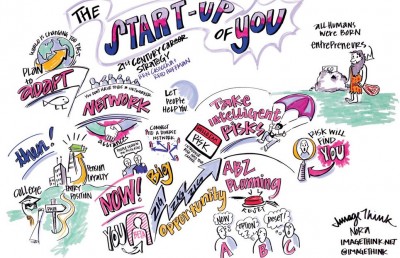Recently I have read Eric Ries’ The Lean Startup, and it got me thinking on multiple levels. It had so many interesting insights and counter-intuitive results, that it really inspired me to take a good look at so many things I’ve been doing. I’m not running a startup (yet) by the common definition as in running a company, but take a look at his definition:
A startup is a human institution designed to deliver a new product or service under conditions of extreme uncertainty.
First, this pretty much applies to the physics lab I’m working in as a post-doc at the moment: team, uncertainty, novelty. Most definitely have to take a big look how can I that group better using the lean lessons (in another post).
On the other hand, could this definition apply to quite different but just as important thing: myself? I do aim at creating something new, making a person like no-one else in the history; I am extremely uncertain; and I’m a human as well (though not sure how many humans one needs for an “institution”).

Could these lessons somehow adapted to one’s own development as a person? Can the observations be far-fetching enough to encompass this much?
Startup lessions applied to a person
Here I’ll be picking out some points that stood out for me, and see if I can use them to be more successful – whatever that means (getting there in a minute).
Stop wasting people’s time
This is probably the number one thing he brought up. Stop wasting people’s – and your own – precious time. Don’t build a product that nobody wants (if you are a company), don’t make things unnecessarily troublesome for others. If discussing something, get to the point. If want something, use your voice. Don’t promise something then underdeliver. Make things transparent, whether it’s about good or bad things, since then others can make up their own mind with complete information and minimal distortion.
Make it clear to others that you expect the same from them as well.
When it is about myself, I should really figure out what is wasting time, and what is valuable. It is not always obvious, playing games, reading, watching a movie, checking things on the ‘net, writing emails can be just as much be a growing experience as total, utter timesink. I know already I have a lot of timesinks, now have to eliminate them so I can spend more time with the things I value. But it’s only me who can decide it, since everyone’s values are different.
I do feel that if there’s only one advice from the book to take, this would be it.
Learning
The second major thing that got to me, that the aim of the startup is actually learning. One has to learn what are the good things to do, how to handle different situations, what do people react positively, or even just how people react to different changes one makes in the startup setting. Success is then the amount of validated learning.
But this is the same thing for people: I should set up hypotheses, and learn about them, try to prove and disprove the fastest way possible, so I can improve my attitude and behaviour towards the world. By gaining more understanding, success is then now all that knowledge that I can put to use to achieve the goals I’ve set out to reach.
This learning for myself can be very many, all different kinds of stuff:
- Could waking up earlier make me more productive during the day?
- How can I make myself wake up ealier if I constantly oversleep 5 alarm clocks?
- How to work together with people with the least amount of effort?
- What is the setting I can enjoy my books the most?
- What steps to take to become a better writer?
- Would I improve my work environment if I applied some lean principles to our lab?
- What’s the best way to start new projects?
- Would delegating in some important side projects make them work better?
- What techniques work best for me to learn new languages?
- Would running, swimming, cycling, hiking or something else make me feel (and be) healthier?
These are not all good questions, not all actionable ones. Just all the things that I have brainstormed here, but it’s a start. Would have to take actual things to try and learn from. There are plenty of questions. Now just take the time to formulate plans and learning goals.
How to measure success
This is connected to the learning goals, in a way, that I would have to have some meaningful metrics whether I’m getting closer or not. The idea of “vanity metrics” and “actionable metrics” from the book are really fundamental things as well – way too easy to get useless (and even worse: misleading) vanity metrics of a process (such as total visitor count for a website) instead of actionable metrics (like income from products that didn’t exist in the company X years ago).
This is much harder to apply to people, as a person’s learning goals are probably more qualitative than quantitative, and quantitative things could feel quite awkward or unusual. But still:
- How big part of income is from projects that I have started in the last X years?
- What fraction of my projects are still alive (even if not managed by me) after X years?
- What fraction of people I worked together with started their projects on their own?
- How big part of my communication is with my important long term friends? How many is with new friends? How big portion of my new friends are dropping out of touch within a year?
- What fraction of books I’ve read inspired me in one way or another?
- What fraction of new places I’ve visited, within the country or abroad, are such that I’ve haven’t heard about them X years ago?
- How many new techniques, tools, languages I know and could use / use regularly that I couldn’t X years ago?
- What fraction of ideas I come up with I could turn into working projects?
- What fraction of my expenses I consider “well spent”?
5 Whys
The 5 whys is a very powerful management technique to figure out the root causes of things: whenever something bad happens, ask (and figure out) what was the immediate cause (the first why), then figure out the cause of that (the second), and go back at least 5 layers until you get to the root cause. Here’s an explanation video by Eric Ries how to use that in the startup setting.
It is useful to see beyond the obvious and fix the real issues. Can guide what should one put effort into, and how much. This technique would work right away with myself:
- “I’ve broken an expensive PC card in the lab” (true story)
- Why? – I connected the power supply wrong
- Why? – I had a fleeting thought that it might not work, but didn’t pay enough attention
- Why? – I was too sleepy that day
- Why? – Stayed up too late for too many days in a row
- Why? – Been on Facebook, checking things out
Here you go: cut down on Facebook, sleep better, don’t do anything critical when tired, do stop to think even if I know what should be done, and finally get my electronics knowledge in shape (and check out that power supply).
Outlook
Of course I wasn’t the only one coming up with similar ideas, there’s also for example The Startup of You, that seem to be a bit more focused how you achieve a startup, instead of the things I mentioned here of how to be a better/more successful person using the lean startup principles. Still there might be plenty to learn there. And here’s an infographic about that from Imagethink (picture #2 on their site).

All in all, I want to see how this works out in the long run. Will definitely be a lot of work, but there’s so much to gain, that it worth it. One doesn’t become an Elon Musk, a Salman Khan, Richard Branson or Richard Feynman by sitting around.
And to get there, you can leave me some useful or useless advice in the comments.
3 replies on “The Lean Startup of Me”
:) Nice, my friend.
Thank you :)
As I remember you treated your efforts in similar detail consciously as well, so I’m sure many things are new to me but not that new to you :D Good times, loads to do…
[…] Reading The Lean Startup inspired me to explore doing things better. The biggest impact is seeing myself as a a kind of startup and start using lean ideas to be better at what humans do. […]